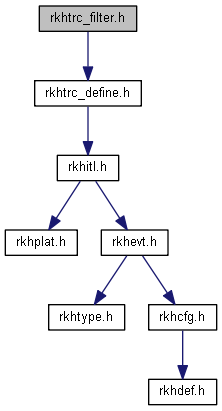|
|
#define | RKH_FILTER_ON_GROUP(grp) rkh_trc_filter_group_(FILTER_ON, (grp), EUNCHANGE) |
| | Suppress the enabled trace events from a specific group. Use the RKH_TRC_ALL_GROUPS to disable all groups.
|
| |
|
#define | RKH_FILTER_OFF_GROUP(grp) rkh_trc_filter_group_(FILTER_OFF, (grp), EUNCHANGE) |
| | Emit the enabled trace events from a specific group. Use the RKH_TRC_ALL_GROUPS to enable all groups.
|
| |
|
#define | RKH_FILTER_ON_EVENT(evt) rkh_trc_filter_event_(FILTER_ON, (evt)) |
| | Suppress (disable) one trace event. Use the RKH_TRC_ALL_EVENTS to disable all trace events.
|
| |
| #define | RKH_FILTER_OFF_EVENT(evt) rkh_trc_filter_event_(FILTER_OFF, (evt)) |
| | Emit (enable) one trace event. Use the RKH_TRC_ALL_EVENTS to enable all trace events. More...
|
| |
|
#define | RKH_FILTER_ON_GROUP_ALL_EVENTS(grp) rkh_trc_filter_group_(FILTER_ON, (grp), ECHANGE) |
| | Suppress (disable) all events in a specific group.
|
| |
| #define | RKH_FILTER_OFF_GROUP_ALL_EVENTS(grp) rkh_trc_filter_group_(FILTER_OFF, (grp), ECHANGE) |
| | Emit (enable) all events in a specific group. More...
|
| |
|
#define | RKH_FILTER_ON_SMA(sma) |
| | Suppress the enable trace events related to a specified active object.
|
| |
|
#define | RKH_FILTER_ON_ALL_SMA() rkh_trc_symFil(RKHFilterSma, 0, RKH_TRC_SET_ALL(FILTER_ON)) |
| | Suppress all enabled trace events related to active objects.
|
| |
|
#define | RKH_FILTER_OFF_SMA(sma) |
| | Emmit the enabled trace events related to a specified active object.
|
| |
|
#define | RKH_FILTER_OFF_ALL_SMA() rkh_trc_symFil(RKHFilterSma, 0, RKH_TRC_SET_ALL(FILTER_OFF)) |
| | Emmit all enabled trace events related to active objects.
|
| |
|
#define | RKH_FILTER_ON_SIGNAL(sig) rkh_trc_symFil(RKHFilterSignal, (sig), FILTER_ON) |
| | Suppress the enabled trace events related to a specified event signal.
|
| |
|
#define | RKH_FILTER_ON_ALL_SIGNALS() rkh_trc_symFil(RKHFilterSignal, 0, RKH_TRC_SET_ALL(FILTER_ON)) |
| | Suppress all enabled trace events related to signals.
|
| |
|
#define | RKH_FILTER_OFF_SIGNAL(sig) rkh_trc_symFil(RKHFilterSignal, (sig), FILTER_OFF) |
| | Emmit the enabled trace events related to a specified event signal.
|
| |
|
#define | RKH_FILTER_OFF_ALL_SIGNALS() rkh_trc_symFil(RKHFilterSignal, 0, RKH_TRC_SET_ALL(FILTER_OFF)) |
| | Emmit all enabled trace events related to signals.
|
| |
Specifies the runtime filter operations for the trace facility.
Definition in file rkhtrc_filter.h.
| void rkh_trc_filter_group_ |
( |
rui8_t |
ctrl, |
|
|
RKH_TG_T |
grp, |
|
|
rui8_t |
mode |
|
) |
| |
Emit or suppress all trace events from a specific group.
The stream is initially created with an empty filter (that is, without filtering any event type). If this is not the required behavior, the application can build a set of event types, include the appropriate event types in it, and apply it as a filter to the stream. After that, the stream will reject any event whose type is in the filter set.
Gathering many events generates a lot of data, which requires memory and processor time. It also makes the task of interpreting the data more difficult. Because the amount of data that the instrumented framework generates can be overwhelming, the RKH supports several types of filters that can use it to reduce the amount of data to be processed. The available groups are enumerated in RKH_TG_<group> definitions.
- Parameters
-
| [in] | ctrl | filter option, the available options are FILTER_ON or FILTER_OFF. |
| [in] | grp | trace group. The available groups are enumerated in RKH_TG_<group> definitions. |
| [in] | mode | filter mode. ECHANGE indicates that the all event's group are accordingly changed as filter option value, otherwise EUNCHANGE. |
- Usage
4 RKH_FILTER_ON_GROUP(RKH_TRC_ALL_GROUPS);
5 RKH_FILTER_ON_EVENT(RKH_TRC_ALL_EVENTS);
- Note
- This function is internal to RKH and the user application should not call it. Please use RKH_FILTER_ON_GROUP(), or RKH_FILTER_OFF_GROUP() macros instead.
| void rkh_trc_filter_event_ |
( |
rui8_t |
ctrl, |
|
|
RKH_TE_ID_T |
evt |
|
) |
| |
Emit or suppress a specific event.
The stream is initially created with an empty filter (that is, without filtering any event type). If this is not the required behavior, the application can build a set of event types, include the appropriate event types in it, and apply it as a filter to the stream. After that, the stream will reject any event whose type is in the filter set.
Gathering many events generates a lot of data, which requires memory and processor time. It also makes the task of interpreting the data more difficult. Because the amount of data that the instrumented framework generates can be overwhelming, the RKH supports several types of filters that can use it to reduce the amount of data to be processed. The available events are enumerated in RKH_TE_<group>_<event> definitions.
- Parameters
-
| [in] | ctrl | filter option, the available options are FILTER_ON or FILTER_OFF. |
| [in] | evt | trace event. The available events are enumerated in RKH_TE_<group>_<event> definitions. |
- Usage
4 RKH_FILTER_OFF_EVENT(RKH_TE_MP_INIT);
5 RKH_FILTER_OFF_EVENT(RKH_TE_SMA_DCH);
6 RKH_FILTER_OFF_EVENT(RKH_TE_FWK_OBJ);
7 RKH_FILTER_OFF_EVENT(RKH_TE_FWK_SIG);
8 RKH_FILTER_OFF_EVENT(RKH_TE_TMR_START);
9 RKH_FILTER_OFF_EVENT(RKH_TE_TMR_TOUT);
- Note
- This function is internal to RKH and the user application should not call it. Please use RKH_FILTER_ON_EVENT(), or RKH_FILTER_OFF_EVENT() macros instead.
